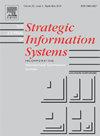Inclusive avatars in the Metaverse: learning from the lived experiences of people with disabilities
IF 11.8
2区 管理学
Q1 COMPUTER SCIENCE, INFORMATION SYSTEMS
引用次数: 0
Abstract
Immersive platforms like the Metaverse have gained attention in information systems (IS) research, yet the diverse needs of people with disabilities (PWD) remain underexplored. This research examines the experiences of PWD using inclusive avatars that represent disabilities. Through an exploratory mixed-methods approach, combining qualitative interviews with an experience sampling study, we develop a framework informed by Affective Events Theory and voices of PWD to better understand how social interactions in the Metaverse impact PWD’s emotions and outcomes. Findings suggest that when PWD use inclusive avatars, inclusive and exclusionary social interactions shape their emotional responses, which in turn influence engagement, avatar connection and satisfaction, and perceptions of inclusion in the Metaverse. Although adopting inclusive avatars can be challenging, especially in the face of exclusionary interactions, the benefits can outweigh the costs. The role of disability identity is critical; PWD who identify strongly with their disability experience less negative emotional impact from exclusion. This research contributes to IS literature by conceptualizing the Metaverse as a relational, emotion-driven environment shaped by social interactions as well as a platform for authentic self-representation. Practical implications include supporting avatar-based disability representation, involving PWD in co-designing virtual reality technologies, and providing training to foster inclusive interactions in the Metaverse. These strategies can help organizations build more inclusive and engaging digital workplaces for an often underrepresented workforce segment.
虚拟世界中的包容性化身:从残疾人的生活经历中学习
像Metaverse这样的沉浸式平台已经在信息系统(IS)研究中引起了人们的关注,但残疾人(PWD)的各种需求仍然没有得到充分的探索。本研究使用代表残疾的包容性化身来检验残疾人士的经历。通过探索性混合方法,结合定性访谈和经验抽样研究,我们开发了一个基于情感事件理论和残疾人士声音的框架,以更好地了解虚拟世界中的社会互动如何影响残疾人士的情绪和结果。研究结果表明,当PWD使用包容性虚拟形象时,包容性和排他性的社交互动会影响他们的情绪反应,进而影响参与度、虚拟形象连接和满意度,以及对虚拟世界包容性的感知。虽然采用包容性的虚拟形象可能具有挑战性,特别是在面对排他性的互动时,但收益可能大于成本。残疾身份的作用至关重要;对自己的残疾有强烈认同感的残疾人士受到排斥的负面情绪影响较少。本研究通过将虚拟世界概念化为一个由社会互动塑造的关系、情感驱动的环境,以及一个真实自我表现的平台,为信息系统文献做出了贡献。实际影响包括支持基于化身的残疾代表,让残疾人参与虚拟现实技术的共同设计,以及提供培训以促进虚拟世界中的包容性互动。这些策略可以帮助组织为通常代表性不足的劳动力群体建立更具包容性和吸引力的数字化工作场所。
本文章由计算机程序翻译,如有差异,请以英文原文为准。
求助全文
约1分钟内获得全文
求助全文
来源期刊

Journal of Strategic Information Systems
工程技术-计算机:信息系统
CiteScore
17.40
自引率
4.30%
发文量
19
审稿时长
>12 weeks
期刊介绍:
The Journal of Strategic Information Systems focuses on the strategic management, business and organizational issues associated with the introduction and utilization of information systems, and considers these issues in a global context. The emphasis is on the incorporation of IT into organizations'' strategic thinking, strategy alignment, organizational arrangements and management of change issues.
 求助内容:
求助内容: 应助结果提醒方式:
应助结果提醒方式:


